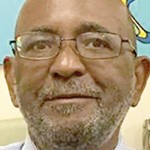Johnny Jackson, former legislator and councilman, dies
29th January 2018 · 0 Comments
By Allen Johnson
Contributing Writer
Johnny Jackson Jr., 74, the former New Orleans city councilman, state legislator, and Ninth Ward leader who died last week, is being remembered as a champion for the poor, the oppressed and equal rights for all.
“Johnny was a person who never met a stranger – bottom line,” says Lena Stewart, his former chief of staff on the New Orleans City Council (1986-1994).
“Everywhere he went, he would light up the room. He loved people.”In an age of political, racial and digital-polarization, Jackson and his personable approach to deep social divides is eulogized, among others, by the former House Speaker of a white conservative district in North Louisiana, a local pioneer of gay rights in New Orleans, and an attorney who represented the militant Black Panther Party for Self-Defense, during confrontations with NOPD nearly 50 years ago.
Former House Speaker E.L. “Bubba” Henry, D-Jonesboro, La., 82, chaired the vaunted 132-member Constitutional Convention of 1973. https://digitalcommons.law.lsu.edu/cgi/-viewcontent.cgi?article=5910&context=lalrev.
Henry appointed then-State Rep. Johnny Jackson of New Orleans (1972-1986) to serve as one of only 11 Black delegates who helped reform the state charter – which became a model for seven other states.
“Johnny contributed a lot because he was a very bright young man. He was not militant. He could be militant if he felt he had to be. He was smart. He was fearless. He was hard-working. If you wanted to know what he thought – he would tell you the unvarnished truth.
“He was concerned about criminal justice for juveniles. He didn’t believe we did enough for correcting and helping the young people who got off the straight and narrow path. He wanted us to be more compassionate than we were. He was just a wonderful human being and one of my favorite people.”
Local attorney Ernest Jones, one of the few Blacks admitted to the practice of law in Louisiana in 1969, represented the Black Panther Party for Self-Defense, during the militant group’s heated clashes with New Orleans police in 1970 – nearly 50 years ago.
“Johnny was one of the strongest soldiers I knew,” Jones said. “In the end, you always knew whose side he was on. Tactically, he would do some things different. Strategically, he would do some things different, but you always knew what side he was on – the poor and oppressed and the people in Desire, most of whom were Black.”
In 1970, Johnny Jackson Jr. – five years out of college – was director of the Desire Community Center. Jackson and fellow community activist Sidney Duplessis organized Sons of Desire to raise political awareness — but not to the revolutionary levels of Panther politics, according to historian Leonard N. Moore’s book on NOPD and Black activism, “Black Rage in New Orleans,” (LSU Press, 2010).
At the same time, Jackson gave voice to community frustration with what was then widely-viewed as the “heavy-handed” tactics of the NOPD: “I am not a revolutionary and don’t claim to be but I do consider myself concerned about my people and the injustices that have existed.”
By the summer of 1970, Black Panthers – seem by some as an armed counterweight to the Klan and police harassment of young Blacks – had arrived in the Desire area of New Orleans. The Panthers’ celebrated breakfast programs and tutoring classes were established – viewed with alarm by the NOPD and the FBI who saw such efforts as propaganda tools for fomenting violent revolution.
The police and Panthers clashed twice – more than a dozen people were arrested. Jackson was among the many detained. Although not a revolutionary, Jackson’s personal encounters with police led him to sympathize with the Panthers,
“If we needed to get something, someone into the Desire community or something out of the Desire community, we could count on him,” Jones recalls, without elaboration. “He was strong in Desire. He would let nobody mess over that community. He learned from his father, Johnny Jackson Sr., who also was a community leader.”
Born in 1943 to Josephine Brown Jackson and Johnny Jackson Sr., young Johnny was educated in segregated New Orleans public schools, graduating from George Washington Carver Senior High in 1961. He graduated from Southern University at New Orleans in 1965 with a bachelor’s degree in Sociology and Economics.
Like other college students in the early 1960s, he participated in black voter registration drives and other civil rights actions.
He joined marches led by civil rights icons such as the Rev. Avery Alexander, Oretha Castle Haley, Arthur Chapital, Earl Amedee and Ernest Wright – demonstrations that could not be mistaken for parades or “photo ops.”
The protests of the day posed far greater risks as Jackson and other New Orleans Blacks embarked on civil rights forays into the more hostile parishes of St. Helena, St. James, St. John and Livingston – a notorious Klan stronghold.
After the 1970 standoff between police and the Panthers, Jackson became more involved with organizations such as the Ad Hoc Community for Accountable Police, the SCLC and the NAACP.
In 1972, he became SOUL’s candidate for state representative. He won. He garnered a reputation as an effective legislator and co-founder of the Black Legislative Caucus, who could bridge deep racial-political-and geographical divides between New Orleans and the rest of the state.
After 14 years, he was a seasoned and respected lawmaker. He was ready to come home and run for the City Council to the disappointment of some of his supporters and political observers in New Orleans.
Asked why, Jackson laughed, telling this reporter: “In Baton Rouge, I’m one of only 144 (legislators). On the City Council, I can be one of seven!”
To skeptics anticipating the return of another politician looking for a sinecure, Jackson proved them wrong.
“We came to the council in May 1986,” Lena Stewart, his chief of staff recalls. “The first big thing he got into (on the council) was supporting gay rights. He was for civil rights for everybody.”
Larry Bagneris, veteran activist of what is today called the Gay-Lesbian-Bisexual-Transgender-Queer (GLBTQ) community in New Orleans, told The Louisiana Weekly. “Johnny Jackson Jr. stood with my community when it wasn’t popular.”
Despite strong opposition from Blacks and whites alike, especially Black churches, Jackson led the political fight that laid the foundation for passage of the gay civil rights bill in New Orleans, Bagneris said. He also championed the creation of the city Human Rights Commission, pressing for better police training, and other efforts that have improved relations between the NOPD and the GLBTQ community since then. “We are light years away from where we were,” Bagneris says. “Johnny Jackson led the way.”
The Honorable Johnny Jackson Jr.’s body will lie in repose at New Birth Baptist Church, located at 3320 Louisa Street, on February 2 from 4-7 p.m. Viewing will continue on Saturday, February 3 from 8-10 a.m. at Beacon Light International Baptist Cathedral (1937 Mirabeau Ave.). Service will begin at 10 a.m.
Mr. Jackson requested cremation. A repast will be held at Zulu Hall (Zulu will be handling the parade).
Jackson’s family has requested that, in lieu of flowers, donations be made to the Johnny Jackson Jr. Foundation, P.O. Box 26404, New Orleans, LA 70186-6404.
This article originally published in the January 29, 2018 print edition of The Louisiana Weekly newspaper.




